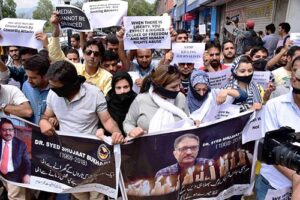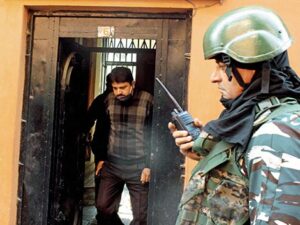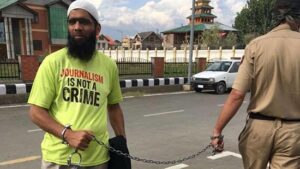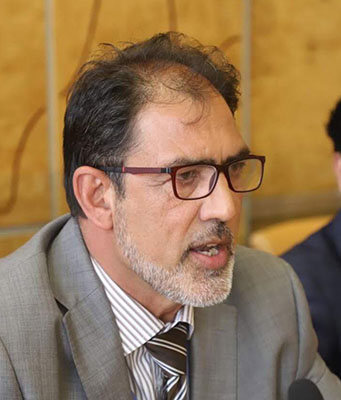Practicing journalism in the Indian Occupied Kashmir has never been an easy job. Along with other segments of the society, the journalistic fraternity too, has suffered immensely because of the continued conflict and turmoil in the region. Since 1989, at least 19 journalists, including a senior journalist and Editor of the Rising Kashmir, Dr. Shujjat Bukhari, were killed while performing their professional duties. A number of journalists, publishers, and newspaper owners also had to face reprisals and illegal detentions under black laws such as the Public Safety Act (PSA) and Unlawful Activities Prevention Act (UAPA). These draconian laws have been used as a weapon to throttle independent journalism by India’s repressive regimes that have always deemed free media as the biggest threat to their illegal rule in the disputed Himalayan region.
Moreover, the uncalled-for curbs on media such as surveillance, formal and informal investigations, harassment, intimidation, restrictions on movement, and mobility of journalists have hugely hampered the objective journalism in the region besides undermining the role of free media.

Denying writers and columnists their right to freedom of opinion and expression, depriving newspapers of their editorial voice, and forcing them to toe the government line remain among the most abrasive measures that the Indian authorities have taken to suppress Kashmir’s independent voices critical to Indian government’s policies in the occupied land.
These colonial-era tactics have rendered the idea of free press in Kashmir meaningless and virtually dysfunctional as it closed the doors for an inclusive and objective reporting of the situation in the region. But despite this, the media industry has stood its ground and resisted with valour the government campaigns to limit its freedom.
However, the worst days for the press in Kashmir’s entire history started in 2019 and continue even today. As the Indian government tightened its hold on media houses, independent journalism came under attack in the restive region through the relentless clampdown and communication blockade.
In the aftermath of 5th August, 2019, when the occupied Kashmir was deprived even of its symbolic special status, the occupation authorities used repressive laws to shut down or suspend independent and critical media outlets highlighting routine human rights violations. The Director of Information Services and Public Services indefinitely banned the printing and distribution of newspapers both inside and outside the valley without citing specific laws or reasons. The illegal ban on newspapers remained in place for several months in 2019 for so-called ‘security reasons’.

Undue restrictions have choked the media. As the situation on the ground continues to deteriorate at alarming levels, there has been a ruthless crackdown on dissent, raising global concern.
The UN Special Rapporteur for Freedom of Opinion and Expression, in various communications to the government of India, expressed concerns regarding the restrictions on the right to freedom of assembly and the right to freedom of expression, as well as the reported pattern of detentions and harassment of journalists and human rights defenders.

Responding to news that the Jammu & Kashmir police has invoked the UAPA against Kashmiri journalists, Avinash Kumar, Executive Director of Amnesty International, India, said that initiating investigations against journalists by the police signal the authorities’ attempt to curb the right to freedom of expression.
While the media was gasping for breath, blocking advertisements to the valley’s leading newspapers and the promulgation of a new media policy in 2020 proved the proverbial last straw that broke the back of the media industry in Kashmir. It was yet another atrocious attack to strangulate free press, which pushed the news media to the brink of extinction and squeezed the space for independent journalism.
The new media policy, which institutionalizes censorship in the region, had overwhelmingly incapacitated the media from giving objective coverage to issues and problems of the people of Kashmir. The media policy was a disastrous recipe to coerce the already strained media into submission.
The post-August 2019 scenario has been even more alarming as hardships for journalists multiplied after the occupation authorities started a vicious campaign of bullying and harassment to prevent the media from performing its legitimate professional duties. The valley, in particular, witnessed an uptick in incidents of police violence against journalists. From harassment, intimidation, and beatings, to being shot at with lethal or non-lethal ammunition, the Kashmiri journalists continue to face a wide range of abuses by the police and other arms of the Indian security forces. Journalists and other media persons are increasingly being attacked, arrested, or summoned to police stations and intelligence centres.
During these turbulent times, there has been a wider upward trend in the use of excessive and unlawful force by India’s so-called security forces and armed reprisals against journalists, with more than 17 media persons summoned by police and security forces for questioning. As the witch-hunt against critical voices continues unabated, illegal detentions, slapping of seditious charges against Kashmiri journalists, and systematic harassment of their families has become a new norm in the valley.
Daunting challenges faced by the media persons could be gauged by the fact that high profile journalists, whose work has been acknowledged and published in prominent international media, became the prime targets of the institutionally enhanced censorship regime and many of them have been booked under PSA and UAPA. Asif Sultan, a thriving journalist is one of those, who has been detained under the UAPA since 2018.
Arbitrary arrests, systematic harassment and intimidation of journalists, and sealing of newspaper offices by the Indian occupation authorities speak volumes about the frightful environment and status of press freedom in Kashmir.
There is no denying that harassment of journalists has always been there but what the media persons have been facing under Modi’s repressive regime today finds no precedent in Kashmir’s history. The use of anti-terrorism laws against journalists by the authorities haunts the entire media fraternity as journalists continue to live in a state of constant fear. So far, dozens of top-ranking Kashmiri journalists, including Gowhar Geelani, Naseer Ahmed Gani, Qazi Shibli, and Masrat Zahra, have been booked under the PSA, UAPA, and other laws. The houses of 11 media persons including Fayaz Kaloo, the Chief Editor of Greater Kashmir, Shoukat Motta of Kashmir Narrator, Hilal Mir, a freelance journalist, and Aslam Bhat of Kashmir News Service were raided by police or the National Investigation Agency (NIA) authorities. The Kashmir Times’ Srinagar offices, which were raided by the NIA sleuths, have remained shut for the past two years.
During the last three years, at least 18 journalists were summoned by police from time to time for questioning over merely reporting on events in Kashmir, which according to new media policy is a criminal offense of serious nature.
Asif Sultan, a photojournalist, remains in detention, despite several appeals from local and international media organisations. Recently, another budding journalist, Sajjad Gul, was arrested on 5th January, 2022. Gul was arrested and booked under criminal conspiracy and other charges, days after he posted a video of a family shouting anti-India slogans after their kin was killed in a gunfight in Srinagar.
Senior journalist and Chief Editor of Kashmir Walla — an online news portal — Fahad Shah is the latest to fall prey to repressive media censorship that has been a hallmark of India’s authoritarian regime’s Kashmir policy. Shah, an internationally acknowledged journalist whose work has been published in the Times, the Guardian, and Christian Science Monitor, was summoned by the police and later detained at Pulwama police station for allegedly ‘glorifying terrorist activities’ and ‘inciting the public.’

Shah has long been a vocal critic of India’s repressive and human rights-abusing regime. His arrest has caused global outrage amid calls for his release. Media organizations within and outside Kashmir have called the arrest an attempt to ‘silence independent journalism.’
In a joint communique addressed to the incumbent governor of Jammu & Kashmir at least 40 press freedom and human rights organisations have urged his intervention to release the Kashmiri journalist.
Reporters without Borders (RSF) and the Committee to Protect Journalists (CPJ) have termed Shah’s arrest as part of a wider clampdown campaign on press freedom in Occupied Kashmir. “The arrest of Fahad Shah shows Jammu and Kashmir authorities’ utter disregard for press freedom and the fundamental right of journalists to report freely and safely,” Steven Butler, CPJ’s Asia programme coordinator in Washington D.C., said in a statement.
In a joint statement, two editors of leading US foreign affairs magazines while calling for the release of the awarding-winning journalist Fahad Shah, said: ‘A free press is essential to democracy; using law enforcement to silence journalists is a dangerous abuse of power’. We urge the authorities in Kashmir to release Shah and to allow journalists in the territory to work freely without being subject to harassment’, the statement said.
The arrest of Fahad Shah and others is part of the BJP government’s clampdown campaign on press freedom across the region. The Kashmiri journalistic fraternity has a long history of fighting for their rights and speaking up in the face of incredible challenges. But the responsibility to stand up for journalists’ fundamental right to freedom of opinion and expression cannot and must not rest solely on the shoulders of the struggling Kashmiri journalists. It is our global responsibility to raise voices in their support to ensure that the ruthless suppression of dissent in the region comes to an end.

The writer is Chairman, Kashmir Institute of International Relations (KIIR), Islamabad. He is a member of the All Parties Hurriyat Conference, AJK chapter.



